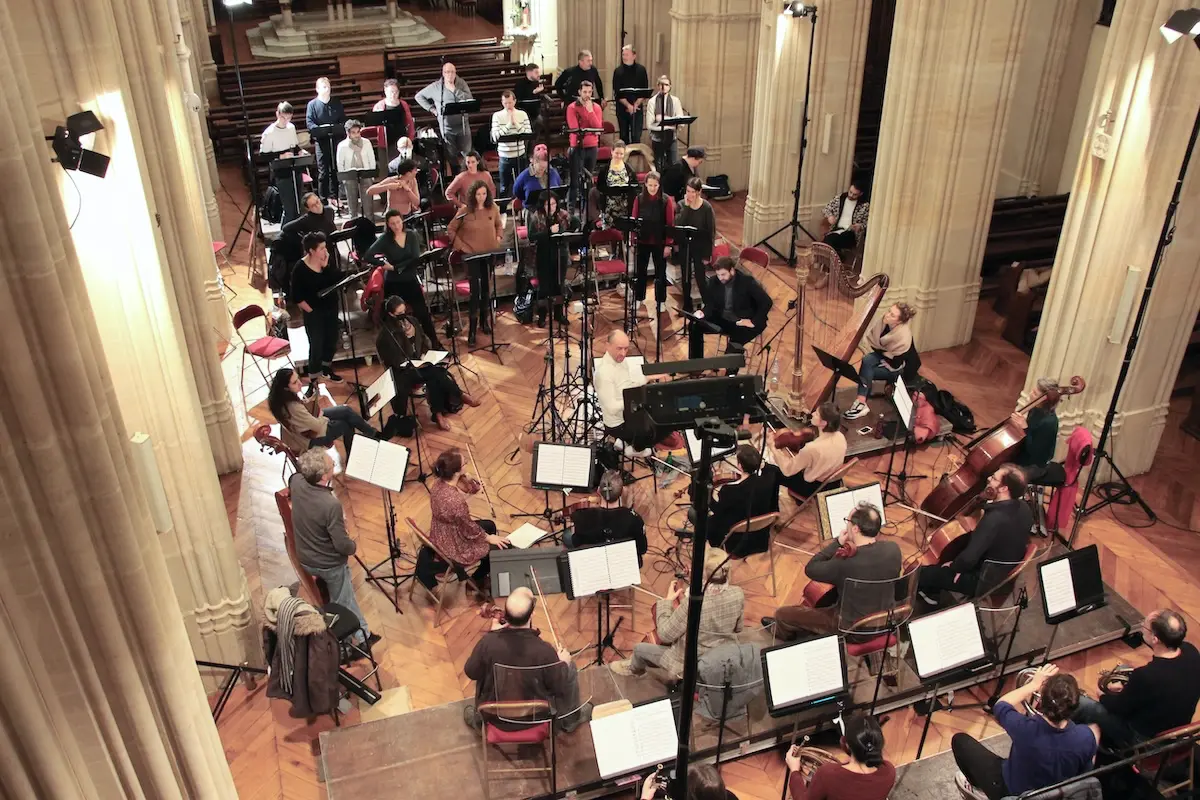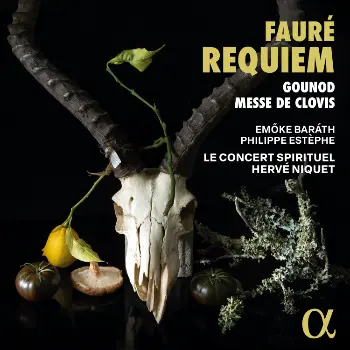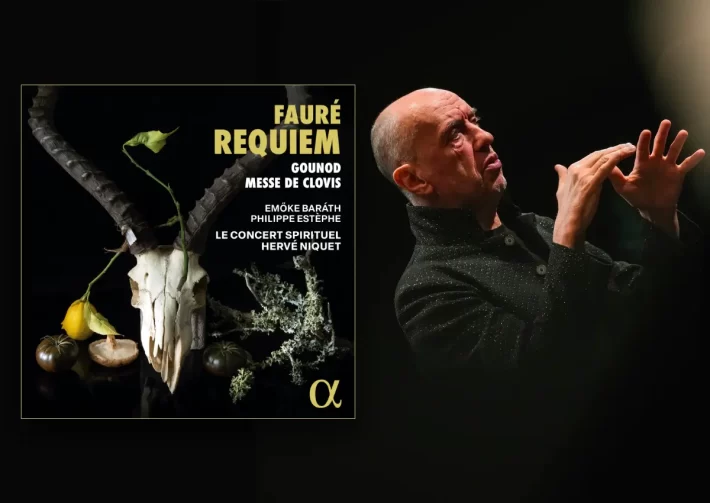Hervé Niquet and Le Concert Spirituel have recorded a substantial amount of Baroque music and classical works over the last few decades. They have also ventured, somewhat hesitantly, into the late Romantic repertoire, and here perform Fauré’s well-known Requiem and Gounod’s Messe de Clovis.
There are three distinct versions of the Requiem. The 1888 version had only five movements (no Offertoire or Libera me), with instrumentation of lower strings – violas, cellos and contrabasses, all in divided parts, without violins saved for a solo violin in Sanctus. It also included four horns, harp and organ. The second version (1893) adds those two movements and parts for bassoon, trumpet and timpani. The 1900 version has the largest orchestration, which was done by one of Fauré’s students and added a violin section to the orchestration. Niquet uses the 1888 orchestra yet performs the seven movements of the 1893 version.
The opening of the first movement is marked Largo in the manuscript (Molto largo in the first published edition, with a metronome marking of Quarter=40). It is usually performed in a grave subdivided four, but Niquet is faster, robbing the music of its solemnity. Despite repeated listening, I never found it convincing. The tempo for the remainder of the movement is more traditional, though the one immediately notes how different the text sounds, because the choir uses “French” Latin. The many differences include several closed, nasal vowels which might prove distracting to those who know the “Ecclesiastical/Roman” pronunciation.
The Offertoire is absurdly fast: Niquet takes 5’30” versus Rutter at 8’25” and Gardiner at 8’28”. The first published edition has a metronome mark of Quarter=48, but Niquet is around Quarter Note = 63, which completely alters the textual effect. The opening alto and tenor duet should evoke humility as they pray that the souls of all be delivered from eternal punishment. Here, it almost sounds like a demand. And Niquet’s tempo also nullifies the magical change in atmosphere ushered in by the baritone solo (here sang by Philippe Estèphe), the harmony shifting from B minor to D major.
The Sanctus moves quickly, but is beautifully sung, though the unmarked acceleration at the climatic cries of “Hosanna” is unnecessary. Soprano Emőke Baráth’s rendition of Pie Jesu is lovely, though many might prefer the gentle sweetness of a boy soprano or woman who sings with the same kind of purity. (A woman would not have been allowed to sing this music during worship at the time of its composition.)
The Agnus Dei is affectingly sung, though as the music builds to its climax (2’58”) Niquet again quickens the tempo, as if he believes that an increase in volume must also bring an increase in tempo. Libera Me is dramatic and compelling (excepting the strange and unmarked accent added to the horn part in the Dies irae section). In Paradisum moves quickly, but the lightness of the performance does suggest the heavenly realm.

Hervé Niquet and Le Concert Spirituel during the recording session (image: ©️ Le Concert Spirituel)
Gounod began composing his Messe de Clovis in 1891 and it was published after his death five years later. It is a composition that shows the composer’s love of Renaissance music, especially the music of Palestrina. Interestingly, the Kyrie is more resolute than pleading, as if there is no doubt that God will forgive our sins. The music is respectful of the text, but rarely tries to express its meaning, though one does sense an earnest pleading for mercy in the final Agnus Dei.
The album ends with two tracks: Aubert’s O Salutaris and an Adagio for violin and organ by Caplet. Both are charming miniatures, beautifully performed.
Alpha’s ancillary materials are excellent, with good notes on the music, several pictures and full texts and translations. If the reader has wanted to less somber introspection in a performance of Faure’s Requiem, this performance may suit you, but I found it superficial and, quite frankly, unmoving.
The Gounod is an interesting discovery, simple and pleasant, but again, not music that explores the theological and spiritual complexities of its text. Even with the two added pieces, the recording offers less than an hour of music – surely in this Fauré anniversary year, they could have added another of his choral works, such as the far less recorded Messe Besse, to fill out the program.
Join The Classical Newsletter
Get weekly updates from The Classic Review delivered straight to your inbox.

Recommended Comparisons (Fauré):
Best | Rutter | Herreweghe | Gardiner
Fauré – Requiem
Gounod – Messe de Clovis
Emőke Baráth – Soprano
Philippe Estèphe – Baritone
Le Concert Spirituel
Hervé Niquet – Conductor

Check offers of this album on Amazon Music.
Album Details |
|
|---|---|
| Album name | Fauré – Requiem |
| Label | Alpha |
| Catalogue No. | 1014 |
| Amazon Music link | Stream here |
| Apple Music link | Stream here |

















